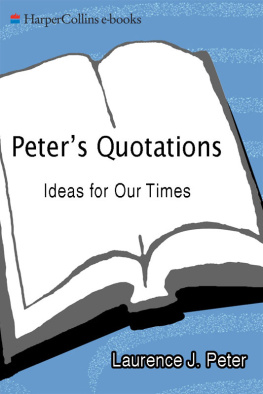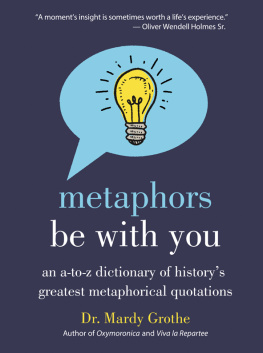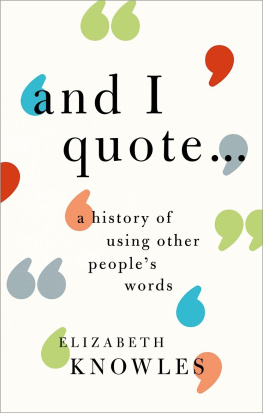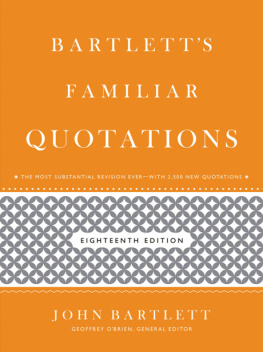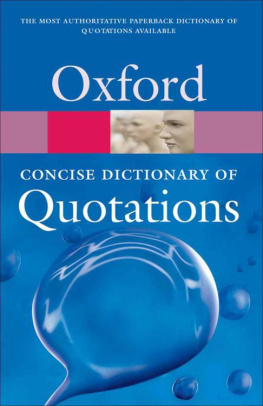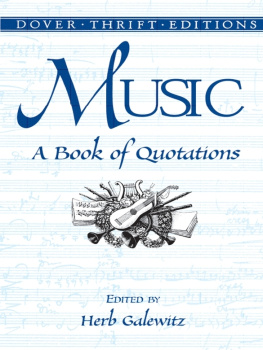THE NEW YALE BOOK OF QUOTATIONSTHE NEW YALE BOOK OF QUOTATIONS Edited by Fred R. Shapiro Foreword by Louis Menand Yale
UNIVERSITY PRESS New Haven and London First published in 2006 as
The Yale Book of Quotations. This revised edition published 2021. Copyright 2006, 2021 by Fred R. Shapiro. Foreword copyright 2021 by Louis Menand.
All rights reserved. This book may not be reproduced, in whole or in part, including illustrations, in any form (beyond that copying permitted by Sections 107 and 108 of the U.S. Copyright Law and except by reviewers for the public press), without written permission from the publishers. Yale University Press books may be purchased in quantity for educational, business, or promotional use. For information, please e-mail (U.K. office).
Designed by Nancy Ovedovitz and set in Scala, Didot, and Syntax types by Newgen North America. Printed in the United States of America. Library of Congress Control Number: 2020946412 ISBN 978-0-300-20597-8 (hardcover : alk. paper) A catalogue record for this book is available from the British Library. This paper meets the requirements of ANSI/NISO Z39.48-1992 (Permanence of Paper). 10 9 8 7 6 5 4 3 2 1 To Murray Shapiro, who brought home a quotation dictionary from the Strand bookstore more than fifty years ago; and To Robert K.
Merton, who stood on the shoulders of giants and whose own shoulders were very broad indeedCONTENTSby Louis MenandSpecial SectionsFOREWORDLouis MenandThe New Yale Book of Quotations is a fun book to browse, and there are not many reference books we can say that about. Maybe the old print version of the Oxford English Dictionary (OED), the pages of which W. H. Auden is supposed to have worn out in his copy. Like the OED, the Yale Book is fun in a scholarly way (if that is not oxymoronic). It does what scholarship is supposed to do, which is to set the record straight and throw light into dark corners.
There is a distinct pleasure just in knowing that Winston Churchill did not invent the term iron curtain, and that Marie Antoinette never said Let them eat cake. It feels good to be a person who knows that The buck stops here originated not with Harry Truman but on a card above an army lieutenants desk in 1929, and that Youre either part of the solution or youre part of the problem, ascribed to Eldridge Cleaver, derives from a prayer by a Congressional chaplain, Peter Marshall, that appears in the Congressional Record for January 1947. And its cool to find out that phrases that seem to have come out of nowhereShit happens, Get a lifeactually came from somewhere. But the pleasure in knowing that a lot of conventional quotation wisdom, of the Bartletts Familiar variety, is often mistaken is not only academic, or fun in the Trivial Pursuit sense. This knowledge is also demystifying. In the quotation universe, as in our mundane material world, the rich get richer, and not always because they earned it.
The bigger the name, the more likely the misattribution. Churchill gets the credit for iron curtain because he is already the owner of a major reputation for colorful phrases. Meanwhile, the lowly wordsmiths, languages burger flippers, labor in obscurity. The Yale Books recovery of these names is a valuable service in the cause of social justice. For it somehow does not shock us to have it revealed, especially in this revised edition, that the distribution of credit for famous sayings maps onto the structure of social relations. Women, it turns out, have often come up with memorable words and phrases standardly attached to men.
There is a sociology of quotation. So I disapprove of what you say, but I will defend to the death your right to say it, everybodys favorite Voltaire quotation, was actually written by his biographer Evelyn Beatrice Hall, as the sort of thing Voltaire might have said. And The only difference between the rich and other people is that the rich have more money was a remark made to Hemingway by the critic Mary Colum. Hemingway liked it so much he borrowed it for his (probably fictional) conversation with F. Scott Fitzgerald. The OED shows us that words have histories, that their meanings have evolved (or, really, shifted in the wind of circumstance) over time.
And the Yale Book shows us that quotations evolve, as well. They are embellished (Play it, Sam morphs into Play it again, Sam), punched up (If you build it, they will come), and bumper-stickered (What would Jesus do?). And, to a greater or lesser degree of significance, quotations are alwaysit is the very nature of the genretaken out of context. We the people of the United States, It is a truth universally acknowledged, April is the cruelest month, It was the best of times, Mistah Kurtzhe dead: they are the pith of much larger texts, convenient handles on the enormous trunk of speech. Their permanencefor, unlike memes, which are shooting stars, quotations are like the planets, quasi-immortalgives the comforting illusion of comprehensibility to the limitless expanse of recorded utterance. We will never read, let alone grasp, all of the work of Martin Heidegger, but knowing the phrase Language is the house of being allows us to pretend we have.
Thats our handle on Heidegger. As with the OED, browsing the Yale Book is also fun in the fun-house sense. A trip through these pages can induce a sensation of vertigo. What is not, potentially, a quotation? If Wheres the beef? and Hes dead, Jim can achieve immortality, so might any phrase, given enough circulation. You can get a happy quotation anywhere if you have the eye, as Oliver Wendell Holmes, Jr. (a veritable quotation mint) put it.
Boiled way down, a quotation is just a string of words that latches on. Every family has its own stock, found verbal objects that get picked up, mimicked, transformed by repetition into mottos or refrains. So does every person. Song lyrics, lines of poetry, bits remembered from childrens books. Its strange how precious these are. They are amulets, charms against chaos, secret mantras for dark times.
The Yale Book tells us where these little bits of ourselves came from. ACKNOWLEDGMENTS The editor has been extremely fortunate to receive outstanding support from staff at Yale University Press. Excellent editorial support and sound judgment came from Sarah Miller, former editor for literature and the performing arts; Ash Lago, language manager; and Adina Berk, senior editor for history. Others at the Press who provided important help included John Donatich, director; Jessie Dolch, copy editor; Nancy Ovedovitz, former design manager; Jeffrey Schier, senior manuscript editor; Sonia Shannon, senior designer; Eva Skewes, editorial assistant; Karen Stickler, assistant designer; and Jenya Weinreb, director of publishing operations. This book benefited greatly from the help of readers and researchers from throughout the world. An enormous debt is owed to Garson OToole, who was inspired by the first edition of The Yale Book of Quotations to create the magnificent website quoteinvestigator.com.
His contributions are described in the Introduction to this volume. Another person who furnished superb research about quotations was Barry Popik, whose website barrypopik. com contains an enormous amount of material about quotations and phrases. Charles Clay Doyle was the principal editor of The Dictionary of Modern Proverbs (the other editors were Wolfgang Mieder and Fred R. Shapiro), a landmark achievement that furnished much information for The New Yale Book of Quotations


